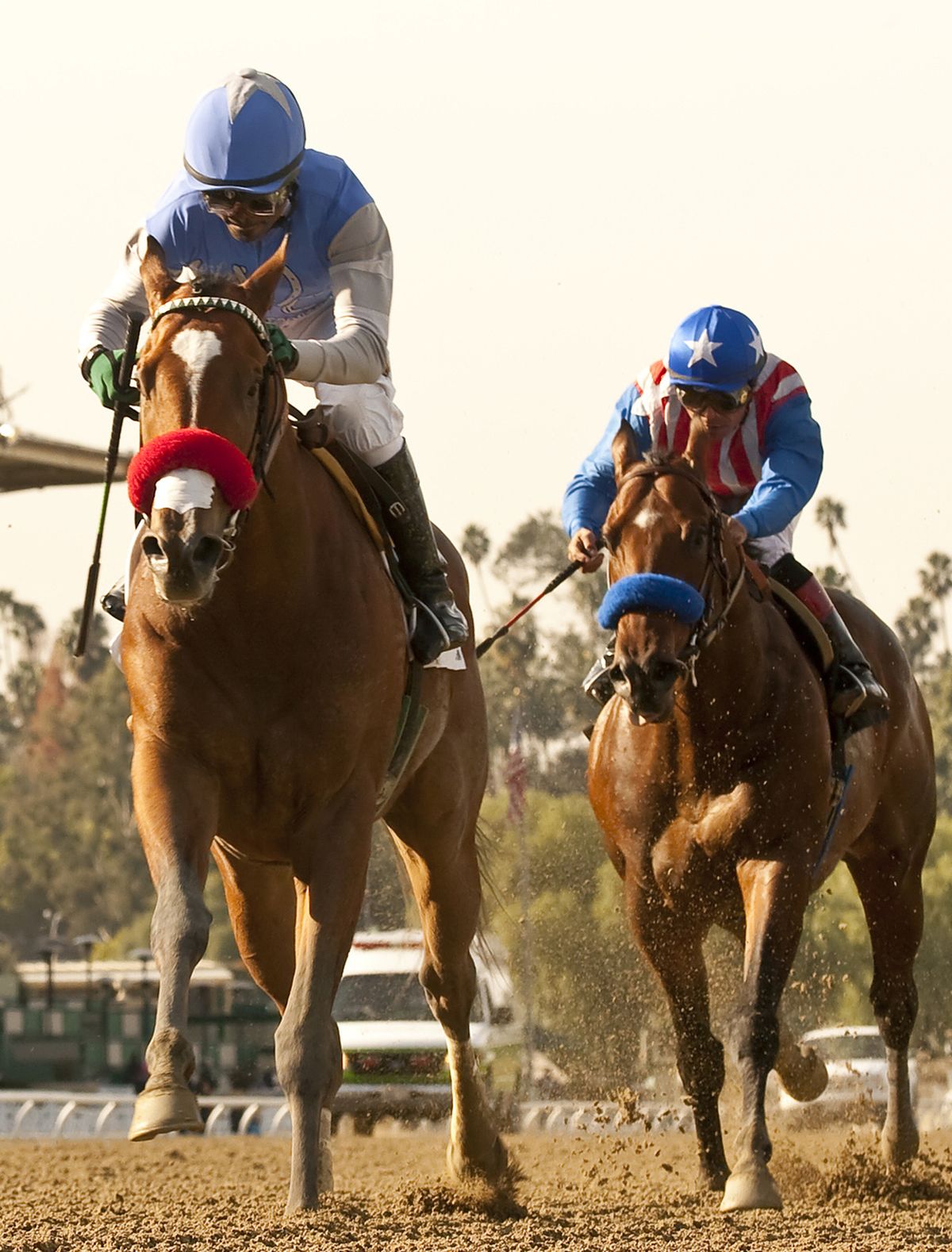Personal mission as important as potential milestone for jockey Kevin Krigger

LOUISVILLE, Ky. – Propped up inside jockey Kevin Krigger’s locker at Churchill Downs is a photo dating back more than a century. Staring back at him is Jimmy Winkfield, the last black jockey to win the Kentucky Derby.
It’s easy to assume the bond between the two men is about color. And that’s true, but only to a point.
On Saturday, Krigger will be aboard Goldencents, the third choice at 5-1, and could become the first African-American rider to win the world’s biggest horse race since Winkfield won back-to-back, in 1901-02. And either way, he’ll be the first just to attempt the feat since Marlon St. Julien finished seventh aboard Curule in 2000.
Krigger wound up in possession of the photo after taping an interview for a documentary. What spoke to him personally wasn’t the long and troubling history of black jockeys that began soon after the picture was taken, but something in the fierce pose that Winkfield struck.
“The look in his eyes,” Krigger recalled, “was telling me, ‘You’re going to do it.’ ”
The 29-year-old makes it clear that the cause he’s most interested in is his own. That was apparent, even at the tender age of 5, when he pulled his horse alongside the family car so he could clamber onto the roof and hop onto the horse’s back. It was all part of his grand plan: “Not, ‘I’m going to be the first African-American to win the Kentucky Derby in 100-something years.’ Just, ‘I’m going to win the Kentucky Derby.’ ”
Albert Krigger smiles when he hears those words now. But it wasn’t always easy back in St. Croix, part of the U.S. Virgin Islands, when he tried to reign in his headstrong son. More than once, the principal called to let Dad know his son was absent from school. He would leave work and head to the remote corners of the island, where he’d find his son riding or racing.
“I’d give him money for schoolbooks and clothes and he’d use it to buy medicine or bandages for the horse. When he was 15 or 16, I gave up,” the father recalled. “I finally said to my wife, ‘He’s going to ride anyway. You can deal with that stuff now. Maybe you’ll have more luck.’ ”
By then, it was already too late. Krigger had a horse named Dandella, whom he ran in match races over quarter- and half-mile flat strips. Over the course of 100 races, he figures he lost no more than four. He started training alongside fellow islander Julio Felix and by 17, decided to follow him to the States.
Krigger rises early – “I never yet saw a horse in bed,” he likes to say. He has a work ethic second to none and the kind of confidence that’s hard to shake. Yet he had no idea how tough the road was about to become.
First, at Thistledown outside Cleveland, and then during a largely frustrating few years on the Southern California circuit, most of the riders Krigger found himself up against were more experienced and much more ruthless. The jockey culture, especially at the higher levels of the sport, was distinctly Latin.
Even today, they are only about four dozen African-Americans among the 1,000 or so active riders in The Jockeys’ Guild. Back in the day, though, they dominated at Churchill Downs. Thirteen of the 15 riders in the first Derby in 1875 were black; they won 15 times among the first 28. But their fame and fortune was soon choked off by jealousy and Jim Crow laws, and soon after the turn of the last century, black jockeys practically disappeared.
Krigger believes it wasn’t his color that held him back, but the quality of his mounts. After a successful stint at Emerald Downs outside Seattle, he returned to Southern California with something to prove. All those early mornings hustling at the racetrack to find a ride finally began to pay off when he landed a few belonging to trainer Doug O’Neill, whose own breakthrough came last season when he won the Derby with I’ll Have Another.
Last September, after letting Krigger work Goldencents, O’Neill lobbied to keep him in the saddle for the bay colt’s maiden run. It was no small favor, but O’Neill has done it before. Last year, relatively unknown jockey Mario Gutierrez delivered for O’Neill in the Derby. Krigger’s payback so far came with a victory in the Santa Anita Derby, one of the most important prep races.
“He worked Goldencents maybe six weeks or so before his debut, and he got off him, and in his best U.S. Virgin accent just said, ‘Wow, man, this horse can really run,’ ” O’Neill recalled. “So I had Kevin and Tom (Knust, his agent) start planting the seeds to the owners. They fell in love with him right away, too.”
One of the colt’s owners was Rick Pitino, whose Louisville Cardinals won the college basketball title last month.
“He’s a cool guy,” Krigger said with a laugh. “What I liked was watching him yesterday, standing off to the side while somebody else was being interviewed. Once everybody saw it was him, he just walked right over, cool as can be, with this look on his face like, ‘Let’s get it on!’ I like that kind of confidence.”
Krigger played a little basketball but nothing he was going to brag about. Most of the boasting is reserved for Goldencents, anyway.
“I’ve been confident since the first day I got on this horse that he was going to be in the Kentucky Derby,” he said.
The truth is Krigger’s ambitions don’t end there, either.
“That picture,” he said, referring to the photo of Winkfield, “is going to take the whole Triple Crown journey with me.”